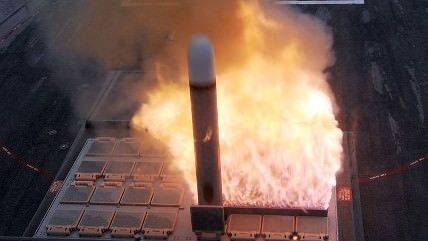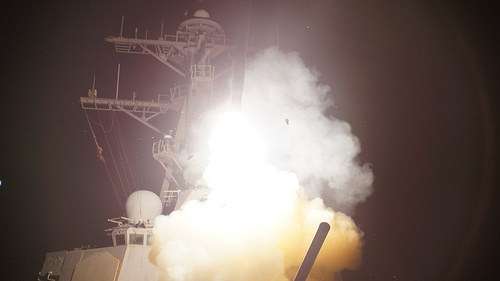Will Limited Strikes Restrict US Involvement in Syria?


I wrote earlier today about how the limited strikes on Syria that Obama is reportedly likely to order in the next few days will not stop the Assad regime from committing atrocities in Syria.
Writing in The New York Times' "Room for Debate" section Micah Zenko, a fellow in the Center for Preventive Action at the Council on Foreign Relations, points out that limited strikes will lead to increased American involvement in the region because limited strikes will be perceived, by both the Syrian government and its opponents, as an assault not only the Assad regime's ability to conduct chemical weapon attacks, but on the regime itself. This, Zenko argues, could lead to the U.S. being dragged into a campaign aimed at removing Assad from power.
From The New York Times:
Based on early reporting, it appears that the only objective of the potential use of force would be to prevent the further use of chemical weapons by the Assad regime.
Therefore, the practical impact of the intervention would not be to protect civilians on the ground from state-directed violence, but to deter Assad from using one type of indiscriminate lethality, chemical weapons. If Obama decides that achieving this outcome is in the U.S. national interests - both in terms of Syria and any deterrent effect it has on the potential use of chemical weapons users elsewhere - then he will likely authorize the reported cruise missile and airstrikes.
However, it is highly unlikely that such an intervention can be so narrow that it will not force a deeper U.S. military engagement in Syria's civil war. Many have compared the potential upcoming use of force to the December 1998 United States and Great Britain attack against Iraq's suspected weapons of mass destruction and ballistic missile capabilities. In that four-day bombing campaign, only one-third of the targets were related to the production of weapons of mass destruction or ballistic missile programs. Similarly, in the case of Syria, most of what the United States bombs would not be directly tied to Assad's chemical weapon production, storage or weaponization facilities. Even a limited cruise missile strike will not be merely an attack on Assad's chemical weapons capabilities, but an attack on the regime itself.
Subsequently, the United States will be correctly perceived by all sides as intervening on behalf of the armed opposition. From there, it is easy to conceive how the initial limited intervention for humanitarian purposes - like Libya in 2011 - turns into a joint campaign plan to assure that Assad is toppled.
That the U.S. could be dragged further into the conflict in Syria with limited strikes is only one of the reasons that the U.S. should not intervene in Syria. Reason's Peter Suderman put up a list earlier today of other reasons why American intervention in Syria would not be a good idea.
Editor's Note: As of February 29, 2024, commenting privileges on reason.com posts are limited to Reason Plus subscribers. Past commenters are grandfathered in for a temporary period. Subscribe here to preserve your ability to comment. Your Reason Plus subscription also gives you an ad-free version of reason.com, along with full access to the digital edition and archives of Reason magazine. We request that comments be civil and on-topic. We do not moderate or assume any responsibility for comments, which are owned by the readers who post them. Comments do not represent the views of reason.com or Reason Foundation. We reserve the right to delete any comment and ban commenters for any reason at any time. Comments may only be edited within 5 minutes of posting. Report abuses.
Please to post comments


"Will limited strikes restrict US involvement in Syria?"
Oh, trick question. "Yes, but only as long as we want our involvement restricted."
We had troops and equipment in Iraq. We just needed to drive across the border to take possession of Syria. And we would have fulfilled our promised to get our troops our of Iraq.
Apparently, drawing down our supply of cruise missiles and then issuing contracts for replacements is far more important to the current administration.
My prediction: "Limited Strikes" will be primarily targeted (although maybe not at first obviously) at softening Syrian air defenses. And the path from there is clear. Unless we know with great certainty the locations of all Syrian chemical weapons depots, I can't see what, other than a decapitation strike on Assad himself, will be achieved by "limited strikes" than to prepare the battlefield for aerial attack and possibly ground operations.
Highly improbable. I almost expect a ground invasion.
The limited strikes are a CYA for Obama, since he made the mistake of using the words "red line".
Striking Syria -- getting involved with the Al Qaedian rebels -- is a typically crazy Obama idea. Neither interventionism nor isolationism should be the abiding principle, but what is in America's interest should determine what our actions should be.
Aren't sulfur, charcoal, and potassium nitrate chemicals? Not to mention whatever they've got packed into the nosecones of those drones.
Has anyone actually seen the evidence that "proves" beyond all doubt that the Assad government is responsible for the chemical attack?
This evidence wouldn't be from the same people who told Colin Powell about the mobile Iraqi chemical labs...or about Saddam Hussein purchasing black cake in Niger, would it?
Isaiah 17.
Is it a matter of Obama's needing to prove he's cruel enough to be worthy of respect? Like the TV commercial where somebody says, "Lux is too mild", meaning that soap has to do damage to skin to be seen as able to clean dishes. So Obama has to prove he can mercilessly kill & maim innocents?if he can find any innocents in Syria.